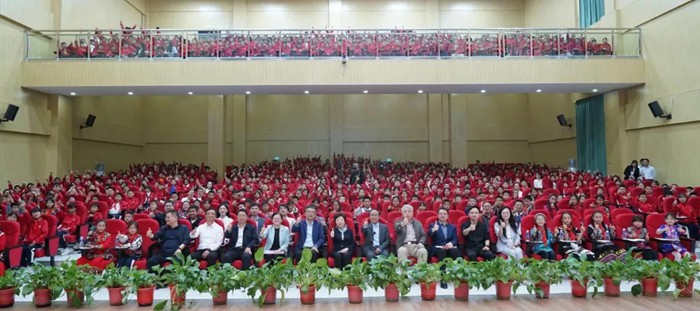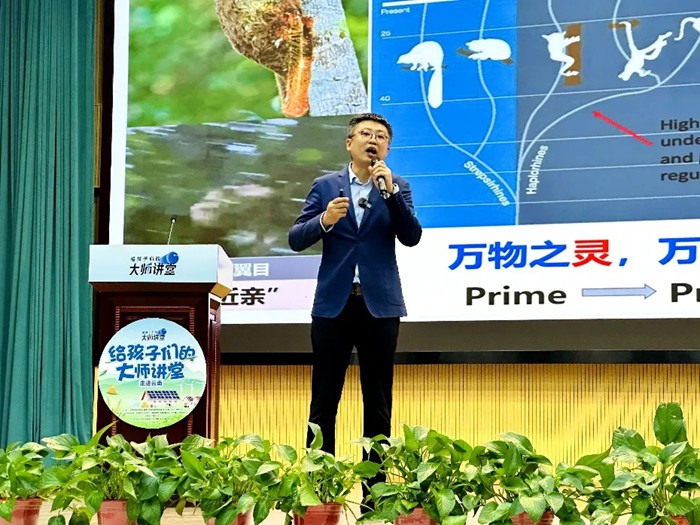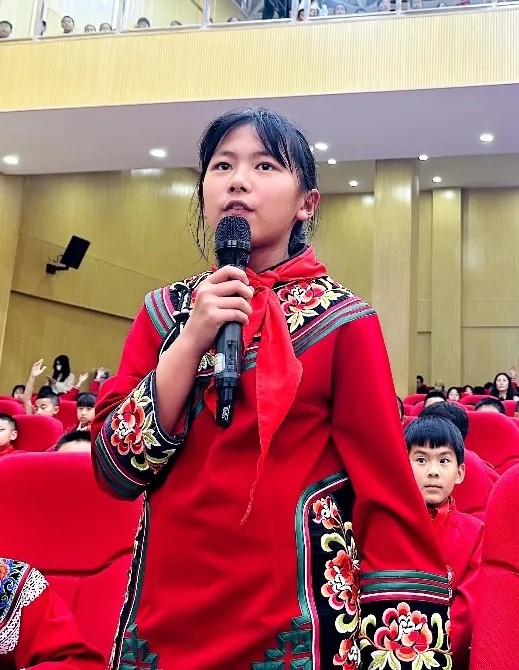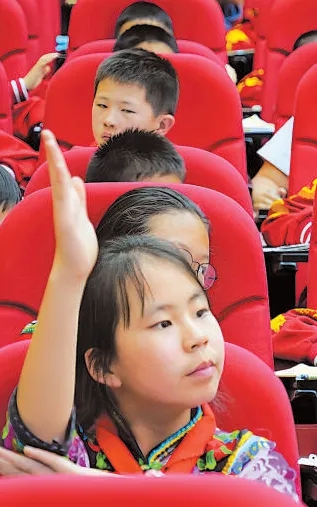The "Master Class for Children" event was jointly held by the China Soong Ching Ling Foundation (CSCLF), the National Natural Science Foundation of China (NSFC) and the Leading Group for Talent Work of the Kunming Municipal Committee of the Communist Party of China (CPC) in the Minzu Primary School of Luquan Yi and Miao autonomous county, southwest China's Yunnan Province, on April 16.
During the event, Zhang Keqin, an academician of the Chinese Academy of Sciences (CAS), plant pathologist and chair professor with Yunnan University, and Qi Xiaoguang, a professor with Northwest University, talked with students about biodiversity under the theme "Safeguarding the Earth's Vigor and Vitality."

Embark on an adventurous journey of microcosms and travel together with marvelous microorganisms

In a lecture titled "Mysterious Microorganisms", Zhang spoke about the definitions of microorganism and nematode, the prevention and control of bacteria and nematodes, fungus and nematode prevention and control. He also elaborated the "Trojan war" initiated by bacteria against nematodes, the mobilization of predatory fungi by bacteria to eliminate their own predators, and the utilization of their "extracellular vesicles" by fungi and nematodes to strike a balance between the two species.
In addition, Zhang related interesting stories to underscore nematode prevention and control strategies and explore the enormous potentials brought by microorganisms in the development of the green agriculture. Teenage attendees became fully captivated by the thematic lecture and they seemed to be little explorers of microcosms.
Zhang responded to their imaginative and intriguing questions about harmful effects done by nematodes upon crops, the existence length of nematodes, and the importance of microorganism research to forest protection. Noting that scientific exploration knows no bounds, he asked them to keep thirsty for knowledge, study hard, remain good at reflection, and hold firmly their dream.
Undercover the world of golden snub-nosed monkeys

Qi talked about the classifications, unique features and revolution of primate species, and highlighted their interesting traits as well as behaviors. For instance, chimpanzees are known for their abilities in memorizing numbers and capuchin monkeys can crack nuts. Macaques have acquired the skills of washing sweet potatoes while orangutans is capable of using such tools as umbrella. His lecture received warm response from students.
According to him, primate species have built various social structures and golden snub-nosed monkeys are a precious key to understand those complex social structures. Scientists have carried out lots of field studies, adopted non-invasive sampling technology in the fingerprint analyses of golden snub-nosed monkeys and the realization of individuals' permanent marking, revealed four-tier social structures of golden snub-nosed monkeys in such units as family, subgroup, group and community, and uncovered the evolution as well as formation of relevant social structures.
Noting that species are the foundation of biodiversity, Qi called on children to love animals, promote ecological conservation, and protect the common homeland of all species.
"I have learned from the thematic lecture that the world of golden snub-nosed monkeys is filled with warmth and love like Yunnan, which is home to many ethnic groups," said Xi Ruifan, a fourth-grade student of the Yi ethnic group. The girl and other children quickly surrounded Qi, talked with him about their feeling, and wrote message to him to convey their longing for knowledge and admiration for scientists.
Yunnan, known as the "world garden" and "species gene bank", has played important roles in biodiversity protection nationwide and ecological conservation in southwest China. The northward migration of wild Asian elephants in Yunnan in 2021 caught huge attention from people both at home and abroad, fully showcasing the country's tremendous achievements in wildlife protection.
The designation of safeguarding the earth's vigor and vitality as the theme of the "Master Class for Children" leg event was aimed at helping children acquire more scientific knowledge and stimulating their interest and love toward biodiversity protection. They have not only gained scientific knowledge but also grasped a deep understanding of their hometown, enhanced personal sense of pride and responsibility, and become motivated for contributing their wisdom and strength to the building of their birthplace and the nation.
Messages from students to scientists


After the "Master Class for Children" leg event, two professors received numerous message cards from attending students.
My sincere thanks go to Professor Zhang since he has arranged his time from busy schedule to hold a lecture for us and plant the seed of scientific knowledge in our heart. I believe that the seed will sprout in the near future. We shall study hard and strive to be talent. Scientific knowledge requires careful observation since it can be found in all aspects of our life. I wish to attend your lecture in the future.
--from Xiao Zhuoran
Thank your Professor Zhang for introducing to us ematodes and fungi and helping us realize that fungi can capture nematodes. Your lecture about microorganisms has motivated our curiosity and encouraged us to explore the unknown world. We are proud of you because you are our model.
--from Li Fuxuan
I has become inspired by Professor Qi's lecture in many aspects. It has broadened my horizon and stimulated my enthusiasm for zoology and evolutionary biology. In terms of thinking, it has helped me foster a thinking habit from the perspective of biological evolution, and realized that all things in the world are constantly evolving and changing. Emotionally, it has awakened my awe for nature and life. Thank you Professor Qi.
--from Yu Syu
It seems to be an amazing journey of scientific exploration to attend your lecture about diverse animal behaviors and evolution. I have acquired abundant knowledge and gained profound reflection of life evolution. Thank you Professor Qi. I wish to attend more similar lectures.
--from Gu Yihan
